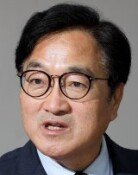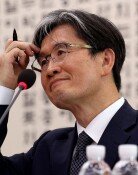[Editorial] Cheers to Kim Hyun-tak and His Research Team
[Editorial] Cheers to Kim Hyun-tak and His Research Team
Posted September. 03, 2005 08:34,
Scientists have presented hope to our long-suffering people once again. The research team led by Dr. Kim Hyun-tak of the base technology research institute at the Electronics and Telecommunications Research Institute (ETRI) has proven through experiments the metal-insulator transition hypothesis. This is very delightful news in that it is an academic feat noted by the global physics community and is a landmark opportunity for the high-tech industry. The team, headed by Kwon Oh-dae, a professor at Pohang University of Science and Technology (POSTECH), has reportedly developed an omega chip that holds power 1,000-fold stronger than existing semiconductor chips; a milestone achievement.
The success of Dr. Kims team is a big accomplishment in the basic science sector that is relatively neglected in academia as well as the government, and this is all the more significant as the discipline has proven itself to be the next-generation growth engine. The research results of Kims team, which proved professor Nevil Motts hypothesis in 56 years, is already being rated as deserving of the Nobel Prize in physics, and its commercial value is also unlimited. If applied to the development of the next-generation display, memory, and heat sensors, the achievement may create a new market worth $100 billion (approximately 100 trillion won) over the next 20 years.
The recent series of success in the Korean science field points us to the way of breaking the trap of a $10,000 per capita income. It is to make an early entry into the global market by linking the results of the basic science sector to the high-tech industry. To that end, it is most important to concentrate our support in the science and technology R&D areas by building industry-university collaboration at the national level. The government must take Dr. Kims words to heart when he said, Weve just undid the first knot. What is more important is the process development for commercialization, which will determine the future of Korea.
In order to become a true science powerhouse, we must further promote human resources development and investment in the basic science sector. As Kims team showed us, the boundary between basic science and applied technology is disappearing. The theory of basic science is immediately converging with industrial applications. We must set the stage and conditions for research where we can grasp the next-generation growth engine and translate the results into national wealth.







